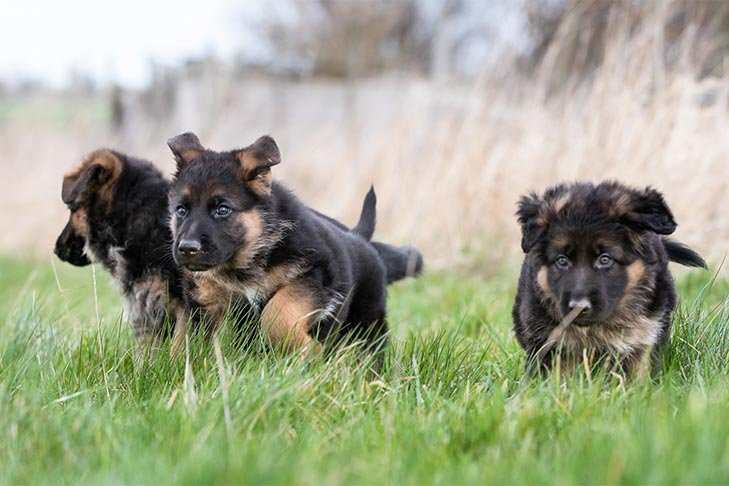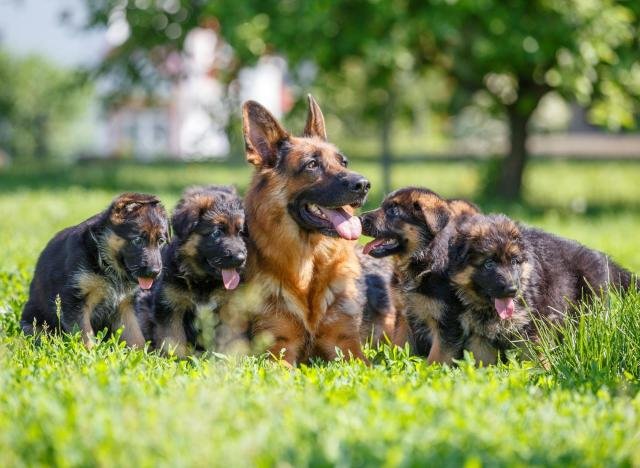Welcome to the exciting world of German Shepherd puppies! If you’re considering bringing home one of these intelligent and loyal companions, you’re in for a treat.
In this comprehensive guide, we’ll cover everything you need to know to ensure a smooth transition for both you and your new furry friend.
From preparation and training to health care and socialization, we’ve got you covered. Let’s dive in!

Chapter 1: Getting Ready for Your German Shepherd Puppy
1.1 Choosing the Right Puppy
Before bringing home your German Shepherd puppy, it’s essential to research reputable breeders or consider adoption from a rescue organization.
Look for breeders who prioritize health and temperament, and be prepared to ask questions about the puppy’s lineage and health history.
1.2 Puppy-Proofing Your Home
Just like human babies, German Shepherd puppies are curious and love to explore their surroundings.
Before your puppy arrives, make sure to puppy-proof your home by removing any potential hazards, securing electrical cords, and investing in baby gates to restrict access to certain areas.
Chapter 2: Welcoming Your Puppy Home
2.1 Establishing a Routine
Consistency is key when it comes to raising a German Shepherd puppy.
Set up a schedule for feeding, potty breaks, playtime, and training, and stick to it as much as possible.
This will help your puppy feel secure and confident in their new environment.
2.2 Introducing Your Puppy to Their New Home
Give your puppy time to acclimate to their new surroundings by providing a quiet and comfortable space where they can rest and relax.
Slowly introduce them to different areas of your home, and supervise their interactions with other pets and family members.
Chapter 3: Training and Socialization
3.1 Basic Obedience Training
Start training your German Shepherd puppy as soon as they arrive home.
Focus on teaching basic commands such as sit, stay, come, and heel using positive reinforcement techniques like treats and praise.
Consistency and patience are key to successful training.
3.2 Socializing Your Puppy
Early socialization is crucial for German Shepherd puppies to develop into well-adjusted and confident adults.
Expose your puppy to a variety of people, animals, sounds, and environments in a positive and controlled manner to help prevent fear and aggression later in life.

Chapter 4: Health Care and Nutrition
4.1 Veterinary Care
Schedule a veterinary check-up for your German Shepherd puppy soon after bringing them home.
Your vet can provide vaccinations, deworming, and a thorough health examination to ensure your puppy is off to a healthy start.
4.2 Nutrition and Feeding
Choose a high-quality puppy food formulated specifically for large breed puppies like German Shepherds.
Feed your puppy a balanced diet, divided into several small meals throughout the day to support their growth and development.
Conclusion:
Bringing home a German Shepherd puppy is an exciting and rewarding experience, but it also comes with its challenges.
By following the tips and guidelines outlined in this guide, you can set yourself and your puppy up for success from the start.
Remember to be patient, consistent, and loving, and enjoy watching your puppy grow into a loyal and cherished companion.

FAQs:
1. How big do German Shepherd puppies get?
German Shepherd puppies typically reach their full adult size between 18 months and 2 years of age.
Males usually weigh between 65 to 90 pounds, while females weigh between 50 to 70 pounds.
2. How much exercise do German Shepherd puppies need?
German Shepherd puppies are active and energetic breeds that require regular exercise to stay healthy and happy.
Aim for at least 30 to 60 minutes of physical activity each day, including walks, playtime, and mental stimulation.
3. Are German Shepherd puppies good with children?
With proper socialization and training, German Shepherd puppies can be excellent family pets and get along well with children.
However, it’s essential to supervise interactions between young children and puppies to prevent any rough handling or accidents.
4. How often should I groom my German Shepherd puppy?
German Shepherds have a double coat that sheds year-round, so regular grooming is necessary to keep their coat healthy and reduce shedding.
Brush your puppy’s coat at least once a week, and bathe them as needed using a gentle dog shampoo.
5. When should I start training my German Shepherd puppy?
It’s never too early to start training your German Shepherd puppy! Begin basic obedience training as soon as you bring them home, and continue to reinforce positive behaviors throughout their life.

